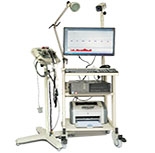Wechat QR code

TEL:400-654-1200

TEL:400-654-1200
Vitamin D/PTH and cardiovascular risk
Held in changsha at the end of April the 12th international diabetes xiangya BBS immunology, Xiangbing from the United States is professor Wang vitamin D/by the thyroid gland hormone (PTH) and the risk of cardiovascular disease in the latest research progress on the seminar, introduced the evidence of vitamin D deficiency is associated with cardiovascular disease (CVD), analyses the potential mechanism of both associated, and analyzes the development direction of future research.Monitor manufacturers
Vitamin D deficiency is associated with cardiovascular disease
Vitamin D deficiency is associated with cardiovascular risk factors such as hypertension, hyperlipidemia, obesity and diabetes. Overall, most studies suggest that vitamin D deficiency significantly increases the risk of cardiovascular disease and death after adjusting for cardiovascular risk factors. Among them, a meta-analysis of nearly 100,000 subjects showed that higher vitamin D levels reduced the risk of cardiovascular disease. Other studies have shown that higher levels of vitamin D may reduce cardiovascular mortality. However, other studies have found no significant effect of vitamin D levels on cardiovascular risk. There have been six studies looking at whether vitamin D supplements reduce the risk of cardiovascular events. Most of these studies have shown no significant effect of vitamin D supplementation on the risk of cardiovascular events. A single study of vitamin D deficiency in patients with kidney disease found that vitamin D supplementation reduced the risk of cardiovascular death.Monitor manufacturers

A possible mechanism by which vitamin D deficiency is associated with cardiovascular disease
The association between vitamin D levels and cardiovascular risk was racially different. The correlation was stronger in caucasians and weaker in blacks, the study found. Possible mechanisms associated with vitamin D risk include: (1) higher levels of vitamin D increase the absorption of calcium in the intestine, inhibit the absorption of cholesterol, promote the excretion of cholesterol from feces, and reduce the formation of triglycerides. Vitamin D deficiency can increase the level of PTH, which can increase the risk of cardiovascular diseases such as cardiac hypertrophy and valve calcification by affecting lipid metabolism, increasing inflammation, insulin resistance, hypertension and other mechanisms. (2) vitamin D can also increase insulin secretion, vitamin D deficiency can lead to reduced insulin secretion and insulin resistance, and then affect lipid metabolism. Vitamin D can also improve endothelial cell function, has the effect of lowering blood pressure, vitamin D deficiency can lead to hypertension. Vitamin D deficiency can also increase cardiovascular risk by affecting kidney, inflammation and other mechanisms. (5) vitamin D deficiency can affect the formation of foam cells and inner sebum plaques. 6 vitamin D also has direct and indirect effects on the expression of vitamin D receptor cardiomyocytes, can regulate the contractility of cardiomyocytes, and can exert indirect effects by affecting blood pressure, inflammation and insulin secretion.
Future research on the relationship between vitamin D deficiency and cardiovascular disease
As for a lot of measure in the study of the correlation of vitamin D levels and cardiovascular events is not good, and vitamin D supplements have no obvious impact on cardiovascular mortality and morbidity, professor wang believes that this may be related to the main measurement of total vitamin D levels, contains with vitamin D binding protein synthesized by the liver in the combination of vitamin D and free vitamin D, not consider the effect of vitamin D binding protein on measuring results. In fact, vitamin D binding protein levels are influenced by race, gender, age, smoking, and liver/kidney disease. For example, blacks have low levels of vitamin D binding protein and therefore low levels of total 25-hydroxyvitamin D, but not high levels of PTH, so their total vitamin D levels are not well correlated with cardiovascular events. Therefore, it is important to consider whether free vitamin D levels should be used to assess the association between vitamin D and cardiovascular disease. In addition, it is necessary to conduct a large number of interventional clinical studies on the impact of vitamin D on the risk of cardiovascular disease in people with low baseline vitamin D levels.